|
 Secure Site
Secure Site
|
 |
 sleeping lady on coach Wean yourself off the alarm clock. After as little as a week of using a regular bed time and wake-up time, you should be able to wake up at about the correct time without your alarm. The more consistent your schedule is, the better, but even if you occasionally go to bed later or earlier than your usual time since you want to watch tv, your body should still feel ready to get up at your set time.
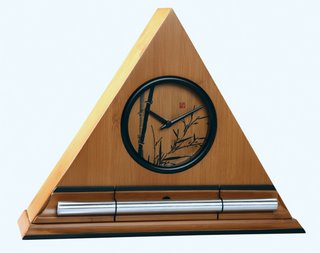 Try Using a Chime Alarm Clock for a Gentle Wake Up Or another suggestion might be to get the gentle, soothing chime alarm clock from Now & Zen, Inc. called The Zen Alarm Clock. The Bamboo Zen Clock’s long-resonating Tibetan bell-like chime makes waking up a beautiful experience – its progressive chimes begin your day with grace. When the clock’s alarm is triggered, the acoustic chime bar is struck just once … 3-1/2 minutes later it strikes again … chime strikes become more frequent over 10 minutes … eventually striking every 5 seconds until shut off. As they become more frequent, the gentle chimes will always wake you up – your body really doesn’t need to be awakened harshly, with a Zen Clock you’re awakened more gradually and thus more naturally.
 Chime Alarm Clock Store, Boulder, Colorado Now & Zen Chime Alarm Clock Shop
1638 Pearl Street
Boulder, CO 80302
(800) 779-6383
Posted in Bamboo Chime Clocks, sleep
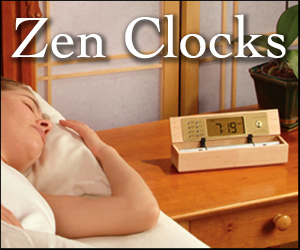 Choose a Gentle Chime Alarm Clock View your sleeping environment and decide what you can control. Awakening can be triggered by external cues such as light and sound; hence the effectiveness of the alarm clock. These triggers can override the circadian rhythm.
- Light: Your mind will respond to light and bring you out of sleep. Leave your curtains or blinds open to wake up with the sunrise. Close them if you need to sleep later. Adjust the positioning of your bed to catch the light at the right time—you may need to move your bed occasionally since the sun will strike your room at a slightly different angle as the seasons progress. If you are camping, locate your tent so that the sun will hit it unobstructed (make sure there are no trees, hills, etc. that will prevent the sun from hitting your tent early in the morning). Remember that the sun rises in the east; in the northern hemisphere a south-facing orientation will receive more sunlight, and in the southern hemisphere a north-facing orientation will get more, but unless you are trying to wake up when the sun is high in the sky, you will still want to face to the east to catch the sun when it rises. As stated earlier, the position of your bed will depend heavily on the time of the year, and the time you want to wake up. If you need to get up before the sun rises, putting the lights in your room on a timer can also help, as this may not seem as disruptive as an alarm clock. Or better yet, choose a gentle, soothing way to wake up like using a Zen Chime Alarm Clock. When the clock’s alarm is triggered, the acoustic chime bar is struck just once … 3-1/2 minutes later it strikes again … chime strikes become more frequent over 10 minutes … eventually striking every 5 seconds until shut off.
 Zen Chime Alarm Clock, for a progressive awakening
- Sound: Noises (such as that pesky alarm) also bring you out of sleep. Identify what sounds regularly occur around where you sleep—and when they occur. Trains, automobiles, animals, and other people going about regular tasks can serve as waking cues. You can take advantage of this by noting what wakes you up and when. Consider leaving your window open to capture more sounds.
- Temperature: Your sleeping body is very sensitive to temperature. If you turn your heat down at night and have a timer on your thermostat, you can set the heat to come back on about an hour before you want to wake up. Assuming you were at a comfortable sleeping temperature all night, this should prompt you to awaken. You can also use temperature in conjunction with light, since sunlight hitting your bed directly will warm you up. You may even be able to choose what blankets you use so that you will be comfortable throughout the night (your body temperature drops after midnight), but begin to get too hot as your body temperature naturally rises (regardless of external temperature), toward the end of your sleep cycle. If you want to take a brief nap outside on a hot day (when you are camping or backpacking, for instance), you can choose someplace to sleep where you will be in a shadow initially, but where you will eventually be in the sun.
 sleep
- Smell: If you drink coffee regularly, the easiest way to use smell as a trigger to awake is to put your coffee maker in your bedroom and set its timer for just before when you want to wake up. Smell is not generally a reliable way to wake up, though, so use this in combination with other methods.
- Feeling: Drink a tall glass of water before going to bed. You will find that you wake up very promptly.and will occasionally have to wake up and use the bathroom, so you’ll be up at least 30 minutes before target time.
adapted from wikihow.com
Now & Zen
1638 Pearl St.
Boulder, CO 80302
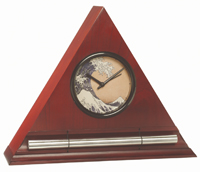 gentle alarms can wake you up so that you are still relaxed
Posted in Chime Alarm Clocks, Natural Awakening, wake up alarm clock
 Combing beauty by Goyou, 1920 When you wake up anyway
Despite all your best efforts, here you are, awake at an hour even a fisherman would call ungodly. What do you do now? First, here’s a big don’t: “If you open your eyes and see the clock, that’s it for many stressed people,” Dr. Walsleben says. “Seeing the time can trigger them to become fully awake.” Keep your eyes closed, roll over, or move the clock so the display isn’t visible.
If you’re still far from dreamland try a mantra. Silently repeat any word that’s soothing or pleasant to you, or simply think “inhale” as you inhale “exhale” as you release your breath. Thinking the words over and over focuses and relaxes you, but requires less energy and attention than counting sheep, which can actually be too engaging to work the way it’s supposed to.
Rather than an artificial recorded sound played through a speaker, the Zen Clock features an alloy chime bar similar to a wind chime. When the clock’s alarm is triggered, its chime produces a long-resonating, beautiful acoustic tone reminiscent of a temple gong. Then, as the ring tone gradually fades away, the clock remains silent until it automatically strikes again three minutes later. The frequency of the chime strikes gradually increase over ten-minutes, eventually striking every five seconds, so they are guaranteed to wake up even the heaviest sleeper. This gentle, ten-minute “progressive awakening” leaves users feeling less groggy, and even helps with dream recall.
What makes this gentle awakening experience so exquisite is the sound of the natural acoustic chime, which has been tuned to produce the same tones as the tuning forks used by musical therapists. According to the product’s inventor, Steve McIntosh, “once you experience this way of being gradually awakened with beautiful acoustic tones, no other alarm clock will ever do.”
adapted from Women’s Health Magazine, by BY LIESA GOINS
Now & Zen – The Gentle Chime Alarm Clocks Store
1638 Pearl Street
Boulder, CO 80302
(800) 779-6383
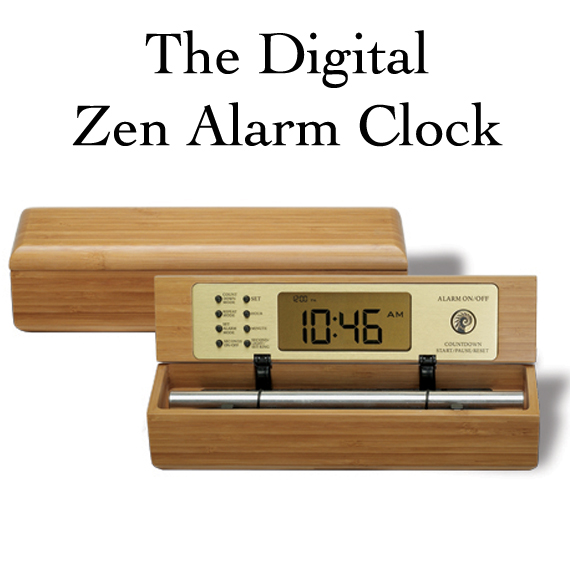 Digital Zen Alarm Clocks with Gentle Chime
Posted in Bamboo Chime Clocks
 Sleep Buzz Study: Seniors Report Sleeping Better Than Younger Adults
The older you get, the better you sleep? Perhaps, suggests a new study that found older adults report sleeping better than their younger counterparts. The research is based on self-reports from 155,877 adults; findings were published today in the journal Sleep. Compared to other age groups, people in their 70s and 80s had the fewest complaints about sleep disturbances and daytime fatigue. In fact, save for a bump in middle age, sleep appears to improve steadily over the course of a lifetime. There are numerous explanations for the discrepancy, study author Michael Grandner, a research associate at the Center for Sleep and Circadian Neurobiology at the University of Pennsylvania, told ABC News. “Perhaps with other pain or health issues going on, older people don’t really see their sleep as a problem, compared to everything else,” Grandner said. “They might also have attitudes and beliefs about sleep that don’t place much importance on getting a good night’s sleep. After all, we live in a ‘sleep when I’m dead’ society that seems to think that sleep is for sissies.”
Boulder, Colorado—an innovative company has taken one of life’s most unpleasant experiences (being startled awake by your alarm clock early Monday morning), and transformed it into something to actually look forward to. “The Zen Alarm Clock,” uses soothing acoustic chimes that awaken users gently and gradually, making waking up a real pleasure. Rather than an artificial recorded sound played through a speaker, the Zen Clock features an alloy chime bar similar to a wind chime. When the clock’s alarm is triggered, its chime produces a long-resonating, beautiful acoustic tone reminiscent of a temple gong. Then, as the ring tone gradually fades away, the clock remains silent until it automatically strikes again three minutes later. The frequency of the chime strikes gradually increase over ten-minutes, eventually striking every five seconds, so they are guaranteed to wake up even the heaviest sleeper. This gentle, ten-minute “progressive awakening” leaves users feeling less groggy, and even helps with dream recall.
By ANGELA HAUPT for US News
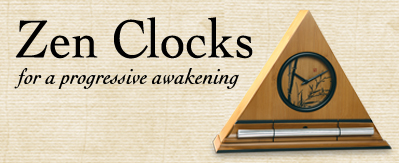 Like organic tomatoes in your salad, the organic sounds of the Zen Alarm Clock's sweet acoustic chimes are truly a gourmet experience. Now & Zen – The Chime Alarm Clock Shop
1638 Pearl Street
Boulder, CO 80302
(800) 779-6383
Posted in sleep
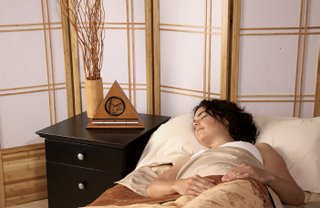 Sleep Issues Sleep Statistics
In 2008 the Centers for Disease Control and Prevention set out to learn just what determines how much sleep Americans get. The lowdown from the survey’s 403,981 respondents follows.
Women are more likely than men to get an insufficient amount of sleep. The results were 12.4 percent of women surveyed versus 9.9 percent of men.
Work helps you sleep. People who are employed get more rest than those who aren’t. But retirees get more sleep than either of those groups. (Only 9.5 percent of retired respondents reported not getting enough z’s.)
More education = more sleep. People with a college degree snooze more than those without a high school diploma or a GED.
Married and single people sleep roughly the same amount. But being divorced, widowed, or separated increases your likelihood of insufficient sleep.
Where you live affects your sleep. West Virginia has the highest rate of sleeplessness—more than 19 percent of respondents. For more sufficient sleep, head to North Dakota, where only 7.4 percent reported inadequate sleep.
The good news? The older you grow, the more likely you are to get enough sleep. People over the age of 65 reported the lowest percentage of insufficient sleep.
adapted from RealSimple.com
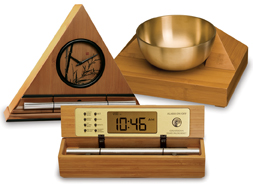 Zen Alarm Clocks Contribute to Good Sleep Habits Now & Zen Alarm Clock Store
1638 Pearl Street
Boulder, CO 80302
(800) 779-6383
Posted in Meditation Tools, mindfulness practice, Natural Awakening, sleep, Sleep Habits, wake up alarm clock
 Meeting Challenges with An Open Heart Reach deep, and find your own inner balance in the midst of crisis
Most of us understand about life being tough, and what it means to be, at least occasionally, on the losing side of things. The end of a relationship, standing helpless as loved ones suffer health problems, experiencing personal financial devastation, or even the grief of losing a job can be debilitating in their intensity, and staggering in their scope. Just switching on the news reveals that if we share nothing else as a world community, we share this one thing: No life is without its own, unique set of tests and troubles. Keeping an open heart in the midst of life’s challenges might be difficult, but it can also be a powerful tool for coping.
Success is not final, failure is not fatal: it is the courage to continue that counts. —Winston Churchill
Courage is easy to talk about, but where does it come from, and where do we find the ability to climb out of bed in the morning when the only thing that’s recognizable is the feeling of despair? Popular wisdom tells us that it’s not what life presents us that’s important, but the way in which we choose to respond. That may be perfectly true, but it doesn’t make it easy. Mariana Caplan, Ph.D., is a counselor, professor of yogic and transpersonal psychologies, and the author of seven books in the fields of psychology and spirituality, including Halfway Up the Mountain and To Touch is to Live (Hohm, 2002), and Eyes Wide Open: Cultivating Discernment on the Spiritual Path (Sounds True, 2009). Caplan, who has lived in villages in India, Central and South America, and Europe, holds degrees in cultural anthropology, counseling psychology, and contemporary spirituality, and has spent years researching and practicing the world’s great mystical traditions. She currently resides in the San Francisco Bay area and teaches at the California Institute of Integral Studies.
“There are many things we cannot control,” acknowledges Caplan, “but one thing we can control, or at least cultivate, is our attitude towards ourselves, our lives, and the situations that life presents. It is through the cultivation of discernment that we are able to have more choice not in terms of what life gives us, but whether we experience these things with gratitude and openness, or whether we fall into defeat.”
Not that this means that it’s an easy task, or that all hardships offer the same challenges. Losing a child, losing a job, and losing a home through foreclosure produce understandably different responses. The sudden illness of a family member or friend, or the diagnosis of a serious health condition of our own likewise elicits a whole host of reactions, and requires any number of considerations.
Respected retreat leader James Finley, Ph.D., and author, along with Carolyn Myss, of the learning course Transforming Trauma (Sounds True, 2009), suggests that in times of extreme difficulty, it’s essential to consider the details of what, exactly, is happening to us, and to accept that we’re very likely doing our best to understand and work through the situation. This, he explains, is the reality of crisis management—what are reality-based ways of understanding the moment, what are the options, and what can be done to provide the best possible outcome?
“We have to consider the impact of the event on our sense of security and identity,” says Finley. “The crisis or trauma has accessed us, and has threatened our sense of who we are. This is the interior dimension of the crisis. This has to do with understanding what trauma is—it’s the experience of being powerless. It’s important to establish a boundary between us, and what is being inflicted or is about to inflect harm. That applies to whatever the crisis is: a medical diagnosis, a relationship falling apart, or a natural disaster.”
The world is full of suffering, it is also full of overcoming it. —Helen Keller
Successfully transcending suffering, says Finley, requires moving toward our centers, and grounding ourselves in this space. This, he says, is where spirituality comes in. “Spirituality is a resource in healing,” he continues. “It helps us to stay grounded in the midst of the circumstances of life, and until you are grounded, you can’t effectively deal with the event. We may have to ride the waves of the storm, but it keeps our boat from tipping over. We might not be able to stop the storm, but maybe we can do something to stabilize ourselves, and ride it though.”
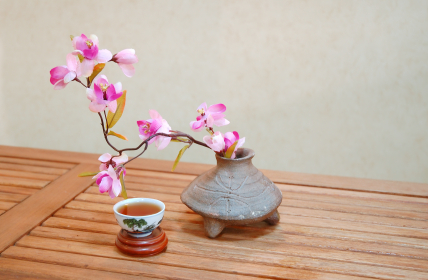 . Once you experience the Zen Timepiece's progressive tones, you'll never want to meditate any other way. It serves as the perfect meditation timer. First, says Finley, find what it is in your life that serves as your point of contact with the spiritual depth that transcends whatever is happening; the realization that inner peace is not dependent on external conditions. This is personal for each of us. For some, it might be religious faith. For others, it’s a guided program, a loved one, or nature.
“When we get afraid,” says Finley, “our hearts contract, our souls contract. Don’t panic. Pause. Reground yourself. Go to your point of contact to get your bearings. By practicing emotional sobriety, you don’t contribute to the situation in a negative way. Remember to tell yourself this: I’m nothing but the Self this is happening to. But I’m not JUST the Self that this is happening to.”
The second step is to have a spiritual practice. Finley defines this as any act habitually entered into with our whole hearts that serves as a way to keep ourselves grounded, and a way to transcend whatever is happening. If our point of contact is a loving relationship with another person, then our practice is to keep in touch with them. That doesn’t mean endless phone calls or visits. Carrying a photo of that person in our wallet, or keeping one on our desk, will suffice. It’s about keeping them firmly in our minds eye, and sustaining our consciousness of this person.
“If your pint of contact is nature, then your spiritual practice is to go out into the garden, or to keep plants in the house that you can nurture, or even to stop on the way home from work to walk in a park or another place where you can be surrounded by nature,” continues Finley. “If your point of contact is a spiritual teacher, then your practice might be to carry around a few words by them. All of these are points of meditation, and serve as ballast. We learn to ground ourselves this way, by taking part in a physical act. It takes fidelity to do this. Crisis is intense, but if we are sincere, we can slowly stabilize.” Third, we must accept that this groundedness in meditation in of itself does not solve the crisis. If a relationship is falling apart, a tornado has struck, or we’ve learned a loved one has a terminal disease, we are still left to face that reality. We ground ourselves as a resource from which to draw the courage to face whatever the catastrophe is. Crisis intervention includes acknowledging and validating the experience, not denying it or diminishing it.
“So, we ground ourselves at the level of the intensity of the pain,” Finley says. “Once we’re there, then we can move forward from that place. Too often, we get stuck in not just what happened to us, but what the thing that happened did to us.”
Pain is inevitable. Suffering is optional. —Anonymous
“Everybody experiences personal challenges in their lives,” agrees Caplan. “If not at the present moment, then in the future or in the past. I think we need to learn to constantly open to what we are given, to feel the feelings of it, to live it fully. We cultivate a trust in life, even when we don’t feel it, and we keep putting one foot in front of the other. Eventually, everything will change—it is just how things are.”
 Meditation It’s always easier, of course, to consider such things when our lives are humming along in relative harmony, our families are healthy, and our finances are secure. But challenges will come. Hopefully, we’ll discover when we come out on the other side of our experience, however difficult it was, that it wasn’t just painful, but that we have somehow been transformed by it. We may have learned to be more at peace, become more humble, or found a previously untapped inner wisdom. Maybe, by deepening our spiritual practices now, we’ll be that much more prepared should we suddenly be presented with a less happy state of affairs. Just as our bodies benefit from regular physical exercise, perhaps it’s also possible to strengthen and fortify our souls. It seems, at the very least, worth a try.
Use our unique “Zen Clock” which functions as a Yoga & Meditation Timer. It features a long-resonating acoustic chime that brings your meditation or yoga session to a gradual close, preserving the environment of stillness while also acting as an effective time signal. Our Yoga Timer & Clock can be programmed to chime at the end of the meditation or yoga session or periodically throughout the session as a kind of sonic yantra. The beauty and functionality of the Zen Clock/Timer makes it a meditation tool that can actually help you “make time” for meditation in your life. Bring yourself back to balance.
adapted from healinglifestyles.com By Debra Bokur
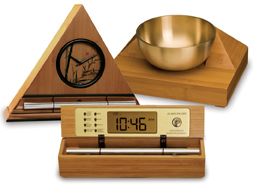 It's exquisite sounds summon your consciousness out of your meditative state with a series of subtle gongs. Now & Zen – The Meditation Timer Shop
1638 Pearl Street
Boulder, CO 80302
(800) 779-6383
Posted in Meditation Timers, Meditation Tools
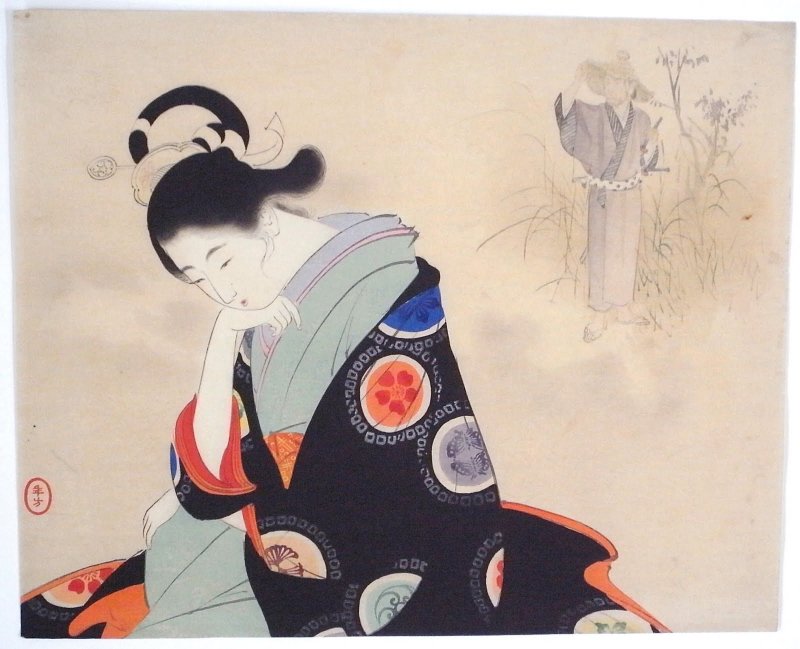 Wake up refreshed, love your alarm clock, transform your mornings with The Zen Alarm Clock's progressive awakening with gentle chimes. Not getting enough sleep may lead to weight gain over time, researchers say
Getting too little sleep can make you hungrier than normal and may lead to weight gain, a small study suggests.
The team at Uppsala University in Sweden used functional MRI to observe the brains of 12 normal weight males while they looked at images of food. This was done on two occasions — after a night of normal sleep and after a night without sleep.
The results showed that a specific brain region that plays a role in appetite shows more activation in response to food images after a night without sleep than after a night of normal sleep.
This suggests that poor sleep habits can affect a person’s risk of becoming overweight in the long run, according to the study published online Jan. 18 in theJournal of Clinical Endocrinology and Metabolism.
 Wake up with gradual, beautiful acoustic chimes. The Zen Alarm Clock transforms your mornings and gets you started right, with a progressive awakening “After a night of total sleep loss, these males showed a high level of activation in an area of the brain that is involved in a desire to eat,” researcher Christian Benedict said in a university news release.
“Bearing in mind that insufficient sleep is a growing problem in modern society, our results may explain why poor sleep habits can affect people’s risk to gain weight in the long run. It may therefore be important to sleep about eight hours every night to maintain a stable and healthy body weight,” Benedict added.
Boulder, Colorado—an innovative company has taken one of life’s most unpleasant experiences (being startled awake by your alarm clock early Monday morning), and transformed it into something to actually look forward to. “The Zen Alarm Clock,” uses soothing acoustic chimes that awaken users gently and gradually, making waking up a real pleasure. Rather than an artificial recorded sound played through a speaker, the Zen Clock features an alloy chime bar similar to a wind chime. When the clock’s alarm is triggered, its chime produces a long-resonating, beautiful acoustic tone reminiscent of a temple gong. Then, as the ring tone gradually fades away, the clock remains silent until it automatically strikes again three minutes later. The frequency of the chime strikes gradually increase over ten-minutes, eventually striking every five seconds, so they are guaranteed to wake up even the heaviest sleeper. This gentle, ten-minute “progressive awakening” leaves users feeling less groggy, and even helps with dream recall.
More information
The U.S. Centers for Disease Control and Prevention has more about preventing weight gain.
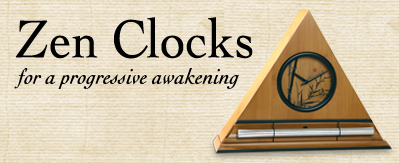 The Zen Alarm Clock transforms mornings, awakening you gradually with a series of gentle acoustic chimes Once you use a Zen Clock nothing else will do Now & Zen – The Chime Alarm Clock Shop
1638 Pearl Street
Boulder, CO 80302
(800) 779-6383
Posted in sleep
 Happiness You don’t have to work for happiness. It’s already here to be experienced in every moment.
Use this practice to rediscover your natural connection with joy.
The more you practice invoking states of well-being, the more available they are. Use the following practice to teach your mind and body to experience joy in the moment. As you invite happiness into your life in this way, you will have more access to a joyful life.
1.Get comfortable and, if you wish, close your eyes. Become aware of your breath, and breathe slowly and deeply. Breathe in relaxation and a sense of ease. Let go of any tension as you exhale. Let the warmth of relaxation flow through your whole body, from your head all the way down to your feet.
2. Find your own way to the still, quiet center of your being, with your body relaxed, your emotions calm, your mind peaceful and spacious.
3. Think of a time when you experienced great joy and well-being, perhaps when you were in a beautiful place or with a good friend.
4. Recall your experience with as much detail as you can. If possible, bring an image of that moment to mind. What was happening? What was the environment like? Were you alone or with others? What sights or sounds can you remember?
5. Remember how the experience of well-being or joy felt in your body. Did your body feel light? Energetic? Expansive? What did joy feel like in your mind? Did your mind feel open? Present? Clear? Take a few moments to let your awareness feel the sensations in your body and the mood in your mind. Let them fully register as you breathe in this feeling of well-being. Relax into it with each exhalation.
6. Practice calling up this image and the feelings of well-being regularly each day for one week. At times, you may find you can simply invoke and sustain those feelings of well-being without having to re-create the specific memory.
Use this practice whenever you are feeling stuck and want to shift to a more uplifted state of mind, or simply want to open yourself to joy.
Although meditation can be done in almost any context, practitioners usually employ a quiet, tranquil space, a meditation cushion or bench, and some kind of timing device to time the meditation session. Ideally, the more these accoutrements can be integrated the better. Thus, it is conducive to a satisfying meditation practice to have a timer or clock that is tranquil and beautiful. Using a kitchen timer or beeper watch is less than ideal. And it was with these considerations in mind that we designed our digital Zen Alarm Clock and practice timer. This unique “Zen Clock” features a long-resonating acoustic chime that brings the meditation session to a gradual close, preserving the environment of stillness while also acting as an effective time signal. The Digital Zen Clock can be programmed to chime at the end of the meditation session or periodically throughout the session as a kind of sonic yantra. The beauty and functionality of the Zen Clock/Timer makes it a meditation tool that can actually help you “make time” for meditation in your life.
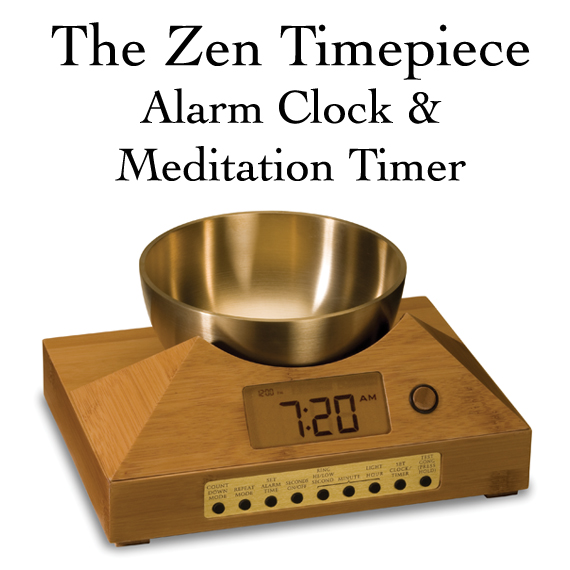 Gong Meditation Timer adapted from YogaJournal.com
Now & Zen – The Gong Meditation Timer Shop
1638 Pearl Street
Boulder, CO 80302
(800) 779-6383
Posted in Bamboo Chime Clocks
 monk Set aside half an hour.
Begin by calling to mind a sage or saint, or another human being you deeply admire. It should be someone you have a feeling for and whose teachings you understand—Jesus, or Buddha, Gandhi, St. Teresa of Avila, the Baal Shem Tov, or your own teacher, if that teacher has been a reliable example of enlightenment.
If no one comes to mind, choose one of the qualities of enlightened consciousness—such as compassion or love. Now, think deeply about that person or the quality you want to embody. Consider how it might be to look through that person’s eyes. If it’s a quality, ask yourself, “How would it be at this moment to look through the eyes of love?” Ask yourself, “How did this being treat others?” How might he or she behave while living your life? (Yes, what would Jesus do?) Imagine facing a challenge, a big conflict, the desertion of someone close. How would that person handle it?
Now, close your eyes and imagine that the spirit of that person (or that quality) inhabits your body. Inhale, thinking to yourself, “Christ’s love lives within me, as my love,” or “Buddha’s state of enlightenment is my enlightenment,” or “The courage of Gandhi is my courage.” Exhale, thinking, “That inner state fills my body.”
 Meditation Practice Do this for a few moments. Then ask yourself, “How would I move through the world if I truly embodied the qualities of this being? How would I treat myself? How would I be with my partner? my kids? my parents? the people on the bus? What would it be like to interact with others?”
Let your imagination completely open to this practice, imagining yourself enlightened, saturated with love. For the remainder of the half hour, act out of that experience. Be the great being you’re imagining yourself to be. Act out the quality you want to imbibe. Do this for half an hour a day for a week and see if you notice the effect.
Meditation is generally an inwardly oriented, personal practice, which individuals do by themselves. Meditation may involve invoking or cultivating a feeling or internal state, such as compassion, or attending to a specific focal point. The term can refer to the state itself, as well as to practices or techniques employed to cultivate the state. There are dozens of specific styles of meditation practice; the word meditation may carry different meanings in different contexts. Meditation has been practiced since antiquity as a component of numerous religious traditions. A 2007 study by the U.S. government found that nearly 9.4% of U.S. adults (over 20 million) had practiced meditation within the past 12 months, up from 7.6% (more than 15 million people) in 2002.
Although meditation can be done in almost any context, practitioners usually employ a quiet, tranquil space, a meditation cushion or bench, and some kind of timing device to time the meditation session. Ideally, the more these accoutrements can be integrated the better. Thus, it is conducive to a satisfying meditation practice to have a timer or clock that is tranquil and beautiful. Using a kitchen timer or beeper watch is less than ideal. And it was with these considerations in mind that we designed our digital Zen Alarm Clock and practice timer. This unique “Zen Clock” features a long-resonating acoustic chime that brings the meditation session to a gradual close, preserving the environment of stillness while also acting as an effective time signal. The Digital Zen Clock can be programmed to chime at the end of the meditation session or periodically throughout the session as a kind of sonic yantra. The beauty and functionality of the Zen Clock/Timer makes it a meditation tool that can actually help you “make time” for meditation in your life.
adapted from YogaJournal.com by Sally Kempton – an internationally recognized teacher of meditation and yogic philosophy and the author of The Heart of Meditation.
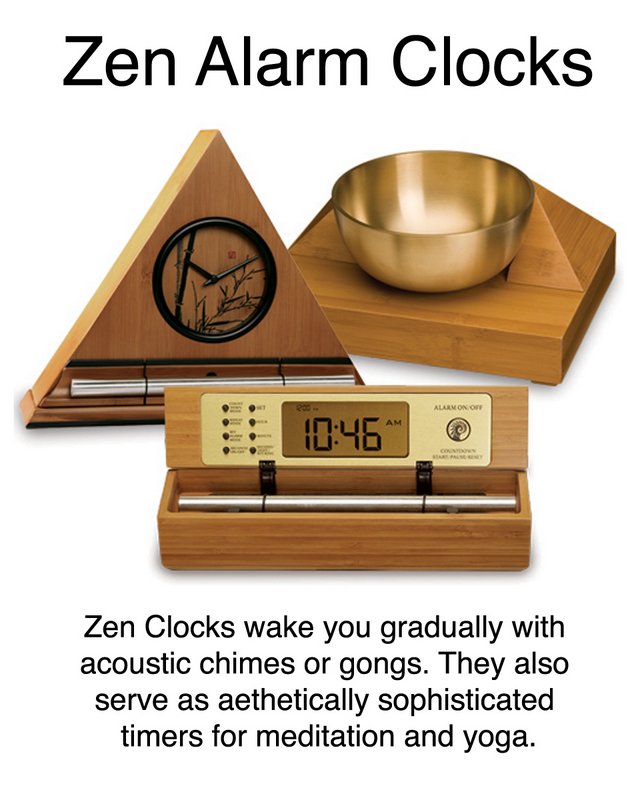 Choose a Chime or Gong Meditation Timer for Your Practice
Posted in Bamboo Chime Clocks
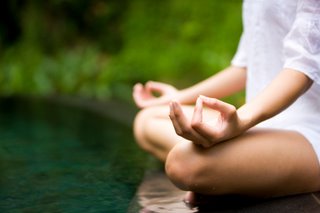 Meditation Problem: You are Tired All the Time
Culprit: Your Adrenal Glands
They’re responsible for secreting the fight-or-flight hormones adrenaline and cortisol, which surge as a response to stress—whether the prehistoric-days type, like being chased by a tiger, or the modern-day version, like financial worries or your mother-in-law. But when you’re feeling stressed all the time, those glands may become overworked and can tire out—a condition commonly called adrenal fatigue, says Keenan. The inability to secrete enough cortisol during the day can cause energy dips, then spikes at night that can interfere with restful sleep.
To give your adrenal glands a chance to recharge, Keenan recommends meditation, which she thinks of as parking the body in neutral. “Meditation has the effect of slowing down the production of cortisol for a while,” she says. Try sitting quietly and clearing your mind. Set your Zen Clock for at least five minutes a day and increase until you are able to sit comfortably for 20 minutes each day. Vitamins B5 and C have also been shown to support adrenal function, says Jacob Teitelbaum, the Kona, Hawaii–based medical director of the Fibromyalgia & Fatigue Centers and the author of From Fatigued to Fantastic!. He recommends getting at least 50 milligrams of B5 and 500 milligrams of C daily. Other stress-reduction techniques work well, too. “Exercise is particularly effective,” says Park.
adapted from RealSimple.com
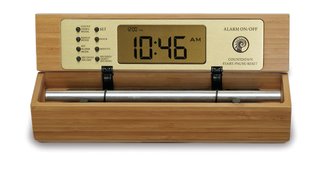 Meditation Tools and Timers by Now & Zen, Inc. Now & Zen Meditation Tool Store
1638 Pearl Street
Boulder, CO 80302
(800) 779-6383
Posted in Chime Alarm Clocks, intention, Meditation Timers, Meditation Tools, mindfulness practice
|
|
|
|